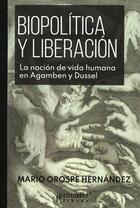
What does the notion of human life mean? In what way does this definition condition our conception of ethics and politics? This work answers these questions based on a dialogue between two traditions: Giorgio Agamben's biopolitics and Enrique Dussel's Philosophy of Liberation. Both proposals are thus placed face to face, within a register of post-secular language that we call profane theology, critically analyzing its foundations, scope, and limits. In the case of Agamben, he wonders why his project has pointed towards the horizon of profanation, as a deactivation of a sacralization of life that, paradoxically, produces living beings stripped of all quality. In Dussel's case, it explores why his project has chosen, instead, to promote service to the poor, as a practical affirmation of the carnal dignity of those excluded from the world and in whom the hope of liberation resides.









